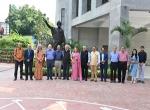Shri S Gurumutrthy, Member, Board of Governors, Reserve Bank of India (RBI), and Chairman, Vivekananda International Foundation (VIF), delivered an insightful talk on ‘The State of Economy: India and the World’ under the aegis of Vimarsha on 15 Nov 2018.
Customary to all Vimarsha talks, the session kicked off with the chanting of peace mantra, and an introductory speech delivered by Dr. Arvind Gupta, Director of the Foundation. Dr. Gupta’s brief opening remarks underlined the prevailing economic upheaval around the globe caused by intensifying trade wars across major economies of the world, protectionism, sanctions, rising oil prices, rising interest rates in the US, appreciation of dollars, among others, which are increasingly becoming the source for volatility in the current global economic order and stoking geo-political tensions. He further elucidated that India, counting almost USD 70 billion in foreign remittances and nearly 40 percent of her GDP (Gross Domestic Product) accrued to foreign trade, needs to remain wary of the impending risks to the Indian economy.
In a scintillating talk, which lasted for about an hour and was followed up with an equally exhaustive Q&A session, Shri S Gurumurthy touched on a wide spectrum of economic issues, especially banking norms, capital adequacy ratio, credit flow to MSMEs, liquidity problem, crypto-currencies, among many others. But most significantly, at the outset of his talk, Shri Gurumurthy, regarded always as a great exponent of an Indian economic model, underscored the need for an India-centric approach in economic planning and decision-making. According to him, such a mode of thought has been absent in India, even while she (India) has been a country with thousands of years of continuity. Going further, he stressed that (economic) institutions that are not built on solid foundations of collective behavior will lose their relevance in future, an oblique reference to the functioning of institutions like IMF, WTO etc. He also opined that the future is going to be geopolitically influenced global alliances.
An influential economic voice, Shri Gurumurthy strongly defended two major economic initiatives of the present NDA government - Demonetisation and the Goods and Services Tax (GST). While he termed Demonetisation a “corrective” measure, he described introduction of a single tax regime across India as a “reformative” measure. Underlining the importance of Demonetisation, he said, “Indian economy could have collapsed if demonetization hadn't happened”.
Speaking ahead of a crucial board meeting of the RBI on 19 Nov, Shri Gurumurthy observed about the crippling effects on the economy due to higher capital ratio maintained by the RBI and the Government’s inability to print currencies, among other problems. The Capital Adequacy Ratio presently regulated by the RBI is 9 percent, one percent higher than what Basel-III dictates, thus leaving the banks with less money to lend, he observed. The Reserve Bank of India Board Member also said that liquidity problem which afflicts India’s economy could have been handled well if the power to current currencies was in the hands of the government. Liquidity crunch is a result of the fetters that were placed on the Centre by the 2002 FRBM law that prevents it from printing of currencies at will.
Shri Gurumurthy also observed that unlike the US which has a market-driven economy, the Indian economy is bank-driven. Arguing in favour of easier banking norms for smooth credit flow to the economy, he stressed, “If you restrict the banks then you are restricting the economy and the flow of funds into the economy”. He backed the government’s position of seeking easier banking rules to ensure credit flow to the micro, small and medium enterprises. The MSME sector – driving the lifeline of India – provides 90 percent of employment and 50 percent of GDP of India, is starved of money, he said.
Notably, Shri Gurumurthy also observed that India has been following the “wrong import policy of having capital goods imports exceeding oil imports. We need to go in for heavy import restriction. We have to cut down the CAD, trade deficit in the next one year otherwise we will continue to accentuate this problem on which all the institutions will have to work together”.
Shri Gurumurthy said that India became free but not independent. This reflects in the lack of original economic thought in India. Therefore the issues facing the Indian economy could be properly dealt with only if there is an India-centric thinking of economy.
Shri Gurumurthy responded to a wide range of questions that were thrown at him by the audience including media personnel. Shri Gurumurthy’s talk was extensively covered in major media outlets like The Hindu, Times of India, Financial Times, Bloomberg, Indian Express, NDTV, among many others.








Post new comment